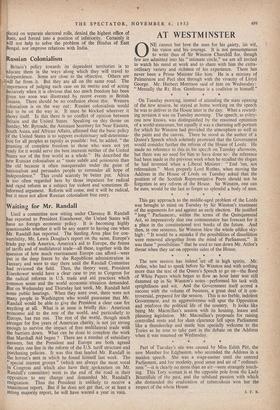AT WESTMINSTER
0 NE cannot but love the man for his gaiety, his wit, his vision and his courage. It is not presumptuous to write thus of Sir Winston Churchill for, though few are admitted into his " intimate circle," we are all invited to watch his mind at work and to share with him the extra- ordinary variety and richness of his experience. There has never been a Prime Minister like him. He is a mixture of Palmerston and Peel shot through with the vivacity of Lloyd George. Mr. Herbert Morrison said of him on Wednesday: " Mentally the Rt. Hon. Gentleman is a coalition in himself." * * * * On Tuesday morning, instead of attending the state opening of the new session, he stayed at home working on the speech he was to deliver in the House later in the day. What a reward- ing revision it was on Tuesday morning. The speech, as every- one now knows, was distinguished by the reasoned optimism of a world-statesman, but equally it was a charming self-portrait for which Sir Winston had provided the atmosphere as well as the paint and the canvas. There he stood as the author of a Queen's Speech which solemnly promised that the Government would consider further the reform of the House of Lords. He made no reference to this in his speech on Tuesday afternoon, but there was no need for him to have done so : the reference had been made in the previous week when he recalled the slogan he had invented when a Liberal Minister : " End 'em, not referendum." Most properly Lord Rothes, when moving the Address in the House of Lords on Tuesday asked that the position of the Scottish Representative Peers should not be forgotten in any reform of the House. Sir Winston, one can be sure, would be the last to forget so splendid a body of men. * * * * This gay approach to the middle-aged problem of the Lords was brought to mind on Tuesday by Sir Winston's treatment of the arguments for and against an early election. He justified " long " Parliaments, within the terms of the Quinquennial Act, so impressively that one commentator has forecast for it a place in the constitutional text books of the future. And then, in one sentence, Sir Winston blew the whole edifice sky- high : " It would be a mistake if the possibilities of dissolution were removed altogether from the mind of Parliament." It was these " possibilities "that he used to ram down Mr. Attlee's throat when they sat on opposite sides of the House. • * * * The new session has indeed 'set off in high spirits. Mr. Attlee, who had to speak before Sir Winston and with nothing more than the text of the Queen's Speech to go on—the flood of White Papers which began to flow an hour later was still dammed up in Sir Winston's notes—performed his task with sprightliness and wit. And the Government itself scored a success with the volume of business, a great deal of it con- troversial, prepared for the session. This is no feeble, indolent Government, and its aggressiveness will spur the Opposition and reinforce the political life of the country. It looks like being Mr. Macmillan's session with its housing, leases and planning legislation. Mr. Macmillan's proposals for raising controlled rents and for slum clearance fell upon Parliament like a thunderclap and made him specially welcome to the Tories as he rose to take part in the debate on the Address when it was resumed on Wednesday. * * * * Part of Tuesday's stir was caused by Miss Edith Pitt, the new Member for Edgbaston, who seconded the Address in a rn maiden speech. She was a wage-earner until she • entered Parliament, and her modesty, good sense and air of " ordinari- ness "—it is clearly no more than an air—were strangely touch- ing. This Tory woman is at the opposite pole from the Lady Bountifuls of the past, and the subdued passion with which she demanded the eradication of tuberculosis won her the respect of the whole House.
J. F. B.


































 Previous page
Previous page